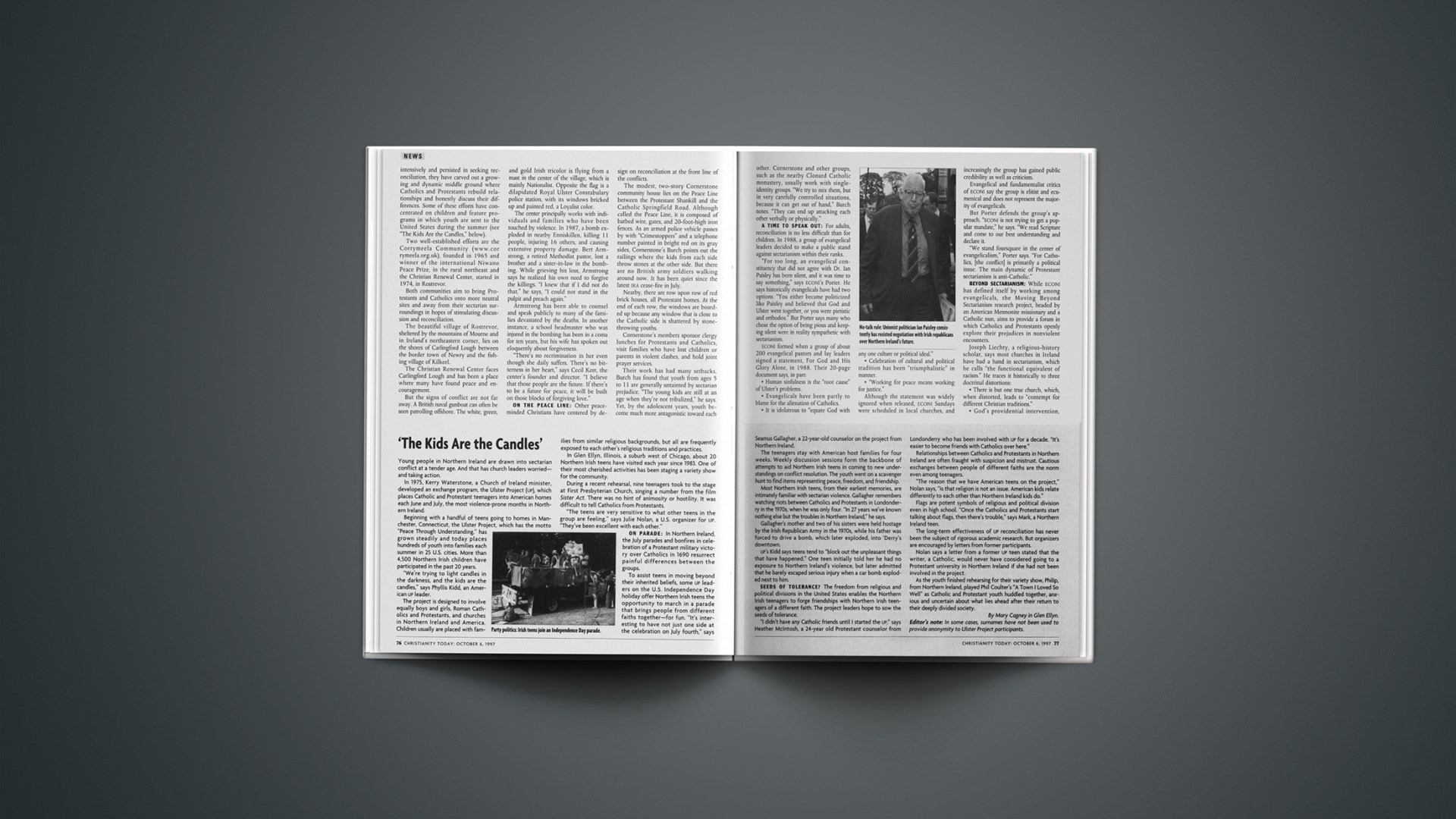Young people in Northern Ireland are drawn into sectarian conflict at a tender age. And that has church leaders worried—and taking action.
In 1975, Kerry Waterstone, a Church of Ireland minister, developed an exchange program, the Ulster Project (UP), which places Catholic and Protestant teenagers into American homes each June and July, the most violence-prone months in Northern Ireland.
Beginning with a handful of teens going to homes in Manchester, Connecticut, the Ulster Project, which has the motto “Peace Through Understanding,” has grown steadily and today places hundreds of youth into families each summer in 25 U.S. cities. More than 4,500 Northern Irish children have participated in the past 20 years.
“We’re trying to light candles in the darkness, and the kids are the candles,” says Phyllis Kidd, an American UP leader.
The project is designed to involve equally boys and girls, Roman Catholics and Protestants, and churches in Northern Ireland and America. Children usually are placed with families from similar religious backgrounds, but all are frequently exposed to each other’s religious traditions and practices.
In Glen Ellyn, Illinois, a suburb west of Chicago, about 20 Northern Irish teens have visited each year since 1983. One of their most cherished activities has been staging a variety show for the community.
During a recent rehearsal, nine teenagers took to the stage at First Presbyterian Church, singing a number from the film Sister Act. There was no hint of animosity or hostility. It was difficult to tell Catholics from Protestants.
“The teens are very sensitive to what other teens in the group are feeling,” says Julie Nolan, a U.S. organizer for UP. “They’ve been excellent with each other.”
ON PARADE: In Northern Ireland, the July parades and bonfires in celebration of a Protestant military victory over Catholics in 1690 resurrect painful differences between the groups.
To assist teens in moving beyond their inherited beliefs, some UP leaders on the U.S. Independence Day holiday offer Northern Irish teens the opportunity to march in a parade that brings people from different faiths together—for fun. “It’s interesting to have not just one side at the celebration on July fourth,” says Seamus Gallagher, a 22-year-old counselor on the project from Northern Ireland.
The teenagers stay with American host families for four weeks. Weekly discussion sessions form the backbone of attempts to aid Northern Irish teens in coming to new understandings on conflict resolution. The youth went on a scavenger hunt to find items representing peace, freedom, and friendship.
Most Northern Irish teens, from their earliest memories, are intimately familiar with sectarian violence. Gallagher remembers watching riots between Catholics and Protestants in Londonderry in the 1970s, when he was only four. “In 27 years we’ve known nothing else but the troubles in Northern Ireland,” he says.
Gallagher’s mother and two of his sisters were held hostage by the Irish Republican Army in the 1970s, while his father was forced to drive a bomb, which later exploded, into ‘Derry’s downtown.
UP’s Kidd says teens tend to “block out the unpleasant things that have happened.” One teen initially told her he had no exposure to Northern Ireland’s violence, but later admitted that he barely escaped serious injury when a car bomb exploded next to him.
SEEDS OF TOLERANCE? The freedom from religious and political divisions in the United States enables the Northern Irish teenagers to forge friendships with Northern Irish teenagers of a different faith. The project leaders hope to sow the seeds of tolerance.
“I didn’t have any Catholic friends until I started the UP,” says Heather McIntosh, a 24-year old Protestant counselor from Londonderry who has been involved with UP for a decade. “It’s easier to become friends with Catholics over here.”
Relationships between Catholics and Protestants in Northern Ireland are often fraught with suspicion and mistrust. Cautious exchanges between people of different faiths are the norm even among teenagers.
“The reason that we have American teens on the project,” Nolan says, “is that religion is not an issue. American kids relate differently to each other than Northern Ireland kids do.”
Flags are potent symbols of religious and political division even in high school. “Once the Catholics and Protestants start talking about flags, then there’s trouble,” says Mark, a Northern Ireland teen.
The long-term effectiveness of UP reconciliation has never been the subject of rigorous academic research. But organizers are encouraged by letters from former participants.
Nolan says a letter from a former UP teen stated that the writer, a Catholic, would never have considered going to a Protestant university in Northern Ireland if she had not been involved in the project.
As the youth finished rehearsing for their variety show, Philip, from Northern Ireland, played Phil Coulter’s “A Town I Loved So Well” as Catholic and Protestant youth huddled together, anxious and uncertain about what lies ahead after their return to their deeply divided society.
Editor’s note: In some cases, surnames have not been used to provide anonymity to Ulster Project participants.
Copyright © 1997 Christianity Today. Click for reprint information.










